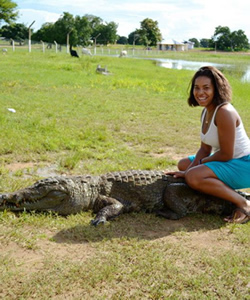“Oh, I’m Christian.”
“What is your Christian name?”
“Sarah.”
I stood outside of the small Ghanaian restaurant where I had eaten lunch the day before as I spoke with one of the workers who had recognized me. It was about 6:30 a.m.; I was finishing a walk I had begun an hour before, observing the Ghanaian capital as it was just waking up.
“Would you treat me differently if I were Muslim? Like would you see me differently if I told you I was Muslim?”
I decided to probe a little further out of pure curiosity; the man’s distinction of it being ‘my Christian name’ intrigued me. Clearly a bit lost in translation, he explained to me how Muslims dress more conservatively, attend a mosque not a church, and can be seen doing their prayers throughout the day. I clarified the intention of my question, asking again in a different way.
“Ahh! No, no…Christian, Muslim, it does not matter. No difference. Everyone is the same.”
We chatted a bit longer and he told me more about how Christians and Muslims make no distinction between themselves. A person’s religion does not define who they are here. People are respected regardless of which faith they choose to practice. Mosques are built a few blocks away from churches, and Christians simply walk around Muslims who stop and do their daily prayers on the sidewalk in the middle of the city. I was amazed at the camaraderie between the two religions, two religions that have for quite some time been butting heads, so to speak, in most other countries around the world. Ghana has certainly found the answer in religious acceptance, and it’s something I think the rest of the world could benefit from.
Ghana is one of the leaders of peace and democracy in Africa, which is a great source of pride throughout the country and something I have been told many a time while here. Knowing this and witnessing the religious acceptance myself, I struggled to understand the reasoning behind the very slight racial discrimination I have observed in my small town of Navrongo, in the most northern region of Ghana.
Everyone around me is Ghanaian; culturally, ethnically, people simply come from a long line of proud Ghanaian families. Some people are very dark skinned, while others just happen to be a bit lighter. It was in Navrongo that I began to notice how much color truly means to Ghanaians. Even though they are ethnically the same, it is irrelevant; color will change how people treat you. Being white here is associated with money.
Many a time beggars have approached the two other Georgetown students with me, both of whom are white. “You are white. You have money.” I was amazed that it was just expected, and vocalized. Being half African-American and half white, I am often stared at as people try to figure out what I am. “You are beautiful, very beautiful.” I’ve just become immune to the stares. I have even witnessed a few women who use skin-lightening products. I also began to notice all of the ‘laborers’ in the ‘lower-ranking’ jobs—the plumbers, the maids, etc.— are all of the darkest tones. The people I have seen on my bike rides through the back streets of my village that work the fields—all of them are very dark. I enter my office at the Navrongo Health Research Center, the leading research center for all of northern Ghana, and the skin tones change; a much higher percentage of the workers are on the lighter side. Of course, ending up with a Ph.D. working at a major research institution also has to do with opportunities presented in one’s life, but I find it very interesting that color patterns exist based upon jobs and status in society. It’s a strange, unspoken dynamic that I have found has subtle niches in this community.
With Ghana wanting to maintain its position as a strong leader in the African world, I think in order to truly do so the same practiced acceptance of religious differences needs to be observed in regards to color. I think this slight change is something that will be very beneficial for the success of this country in the future, not only in the smallest of towns but on a global scale.

